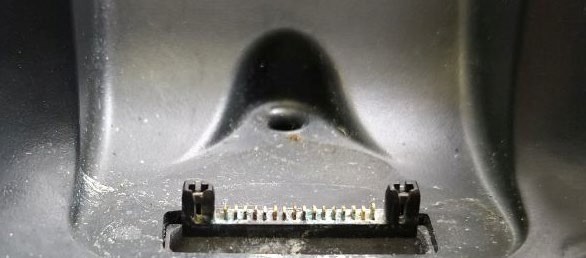
The challenge with rugged devices
Up until now enterprise mobility devices have relied on contact-based docking stations to charge the devices. However the physical connection between the device and the docking station remains a constant point of failure. Enterprise devices are traditionally used in manufacturing, T&L and distribution centres - these environments are often dusty and the contact pins in the docking stations regularly collect debris, dirt and even spilled liquids such as coffee or soft drinks. Overtime these foreign items corrode the contact pins and become a failure point.

Dirty charging dock that requires regular cleaning and maintenance
Add to this workers in these environments are removing the devices from the docks multiple times a day (sometimes up to 20 times) they are concentrating on completing the task at hand and not necessarily focusing on how the device is being placed back into the dock. The result? Damaged or bent contact pins.
Enterprise devices are vital to your business, the inability to charge a device costs twice as much - first there's the loss of productivity and then there's the loss to the bottom line when you have to replace the kit.
Recognising this universal issue, at the 2018 NRF show in New York Datalogic launched two new devices with wireless charging technology, designed to combat the #1 cause of failure for rugged enterprise devices.
What is wireless charging technology?
Wireless charging uses inductive-charging technology to charge devices, thus removing the need for battery contacts and pins. The technology behind wireless charging is not new; it has been in use for over a decade in consumer devices such as toothbrushes, smartphones and even the latest electric cars. Although there are various competing standards for wireless charging, Qi (pronounced "chee") has become the industry standard since its launch in 2010. There are over 3,700 Qi certified products in the market now and this number continues to grow. Today, this technology is now utilized beyond the consumer smartphone and electric toothbrushes - it is available on a number of enterprise mobility devices, pioneered by Datalogic.
3 ways wireless charging improves business efficiency
1. Reduce the #1 cause of rugged hardware failure
VDC research released a report in 2018 that found that the charging contacts were the number 1 cause of hardware failure for rugged hand held devices. Wireless charging puts an end to charging contact failures and eliminates maintenance work such as cleaning the pins, reducing ongoing running costs and business downtime.
2. Lengthen the life of device batteries
Wireless charging technology is good for battery preservation. When a device has reached its full charge, the system will identify this and put the charger into standby mode thus stopping the flow of current to the device. This protects the batteries from potentially overcharging and causing damage. State of the art wireless charging systems also monitors the temperature of the battery and automatically adjusts the charging rate to protect against cell degradation, lengthening the life of the batteries
3. Customise charging profiles to suit unique requirements
The ability to set charging profiles also gives the user freedom to customise settings such as charging speed. This means whether businesses want to leverage fast charge for critical operations or to protect their investment by charging the devices over a longer period of time, depending on their unique use case and needs, there is the option to optimise accordingly.
If you have experienced these challenges with your mobility devices using contact-based charging, we have a number of demo devices available for you to find out if going to wireless is the right move forward.
Get in touch with me today on +64 21 190 6011 or lauraf@sektor.co.nz for more info.

Laura Foley
Enterprise Mobility Business Development Manager
Sektor Ltd
www.sektor.co.nz
